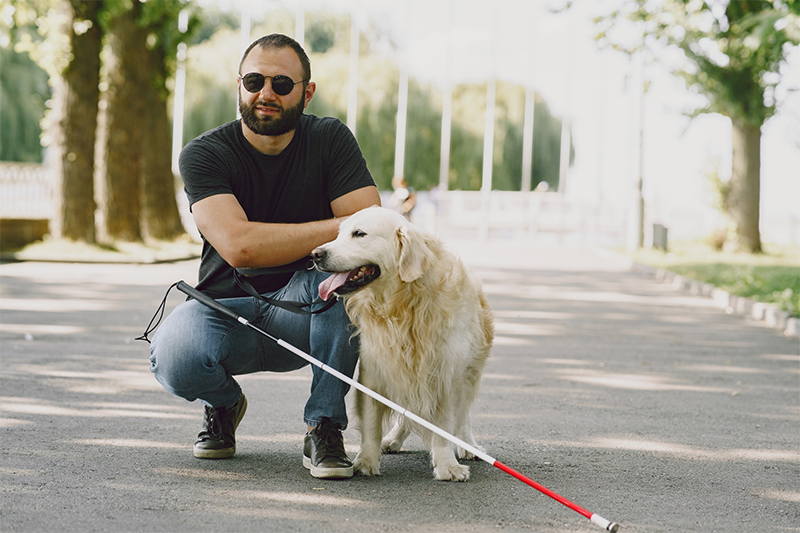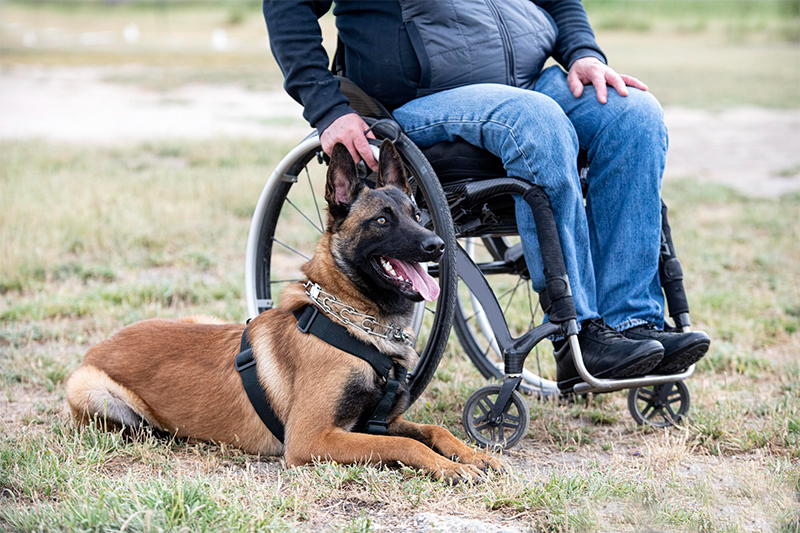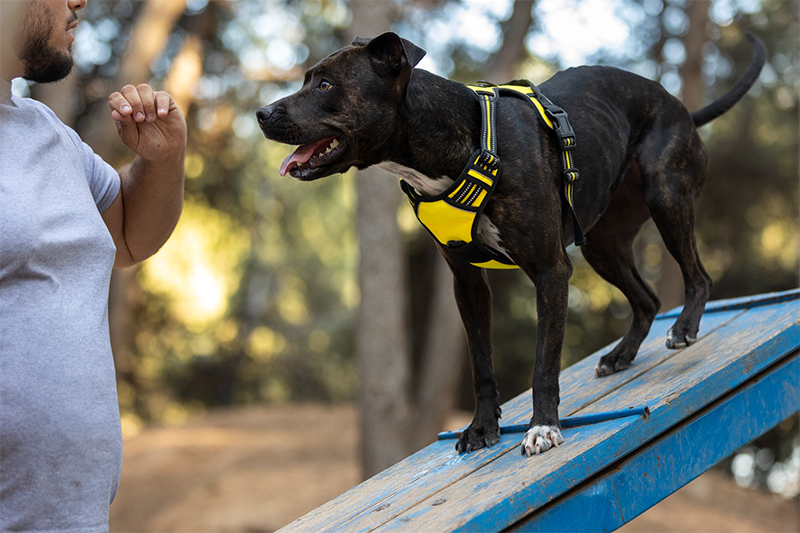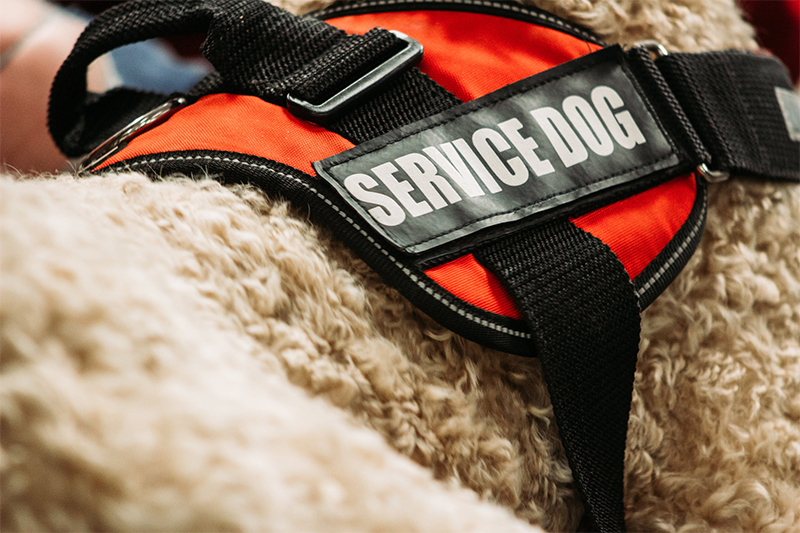Definition of Service Dog
In recent years, the use and importance of service dogs have grown significantly. These highly trained animals provide invaluable support and assistance to individuals with:
- Diabetes
- Mental Illnesses
- Physical Disabilities
- Seizure Disorders
Service dogs are specially trained to perform tasks that mitigate their owner’s disability, enabling them to navigate daily life with greater independence and confidence.
According to the Americans with Disabilities Act (ADA), a service dog is defined as a dog that is individually trained to perform tasks for an individual with a disability. [1]
These tasks can range from guiding individuals who are blind or visually impaired to alerting individuals with hearing impairments to sounds in their environment.
Service dogs can be trained to assist individuals with conditions that substantially limit a person’s ability to perform major life activities.
Emotional support animals, therapy animals, and companion animals are not considered service dogs under the ADA; despite providing comfort and support.
The training and certification of a service dog are critical in establishing its legal status and rights under the law. [2]
Although the purpose of a service dog is to protect, there have been instances where a service dog attacks either their assigned person or someone else in the community. These legal situations can be complicated.

Legal Challenges Associated With Service Dog Attacks
In cases where a service dog attack occurs, the responsible party may face criminal charges, typically classified as misdemeanors.
These charges can result in fines, potential restitution payments to cover the injured party’s medical expenses and other legal consequences.
The severity of the charges and the resulting penalties may vary depending on the jurisdiction and the extent of the injuries caused by the attack.
Impact on People with Disabilities
These attacks not only pose physical risks but can also create emotional trauma and psychological distress for the victims.
For people with disabilities who rely on their service dogs for assistance and support, an attack can be particularly devastating.
The situation may undermine their sense of security and make it difficult for them to trust their own service animal.
Physical injuries resulting from attacks can further exacerbate their disabilities and impair their mobility or independence.

Physical Injuries Caused by Service Dog Attacks
Physical injuries caused by service dog attacks can range in severity, with common types including minor bites and scratches to severe puncture wounds and deep lacerations.
Bite injuries can be especially dangerous and may require immediate medical care. Depending on the force and duration of the attack, individuals may experience:
- Dislocations - If a service dog attack is particularly severe, it can cause a victim to suffer dislocations in their joints or bones. This may require medical attention and physical therapy to heal fully.
- Fractures - Service dog attacks can also lead to broken bones, which can be difficult to heal without specialized treatment. In some cases, surgery may be required to repair the damage caused by the attack. These broken bones can occur from the force of a bite or from falling when trying to flee from an attack.
- Trauma to the face and head - Service dog attacks can cause a variety of trauma to the face and head, including lacerations, bruising, or even blunt force trauma. Depending on the severity of the attack, this can result in serious long-term damage, such as nerve damage, vision loss, or hearing loss.

Bites can result in infections if not properly cleaned and treated. Scarring and disfigurement may also affect the injured person, especially in cases where surgery is necessary to repair the damage. Nerve damage is another potential long-term consequence, which can lead to:
- Loss Of Function
- Numbness
- Pain
Individuals who experience physical injuries from service dog attacks should seek medical attention promptly.
In addition to ensuring proper treatment and wound care, documenting these injuries will be necessary for seeking compensation for medical expenses and damages.

Risk to Other Animals from Service Dog Attacks
When a service dog, which is trained to assist individuals with disabilities, attacks another animal, it can result in severe bodily harm or even death. These attacks may occur due to various reasons such as:
- Inadequate Training – The lack of proper training and socialization can make service dogs more prone to aggression, which can result in attacks on other animals.
- Negligence – If the owner of a service dog fails to take proper safety precautions or fails to supervise their animal, this can lead to attacks on other animals.
- Unfamiliarity – Service dogs may become fearful or aggressive when they are placed in an unfamiliar environment, such as a pet store or a dog park. This can lead to them attacking other animals out of fear or confusion.
In instances where a service dog attacks another animal, the owner or handler may face legal consequences.
In some cases, the owner or handler might be held liable for damages caused by their service dog’s attack, consequences may include:
- Animal Removal – In some jurisdictions, an animal that has been involved in a service dog attack may be removed from the home and placed in a shelter or rescue facility.
- Compensation for Pain and Suffering – An animal attacked by a service dog may suffer physical pain and emotional trauma, which can have long-term implications. In these cases, the owner or handler of the service dog may be required to provide compensation for this pain and suffering.
- Criminal Penalties – Depending on the jurisdiction, an attack by a service dog may result in criminal penalties for the owner or handler. This could include fines, jail time, or community service.
Risk to Individuals in Public Spaces from Service Dog Attacks
When a service dog attacks, the individual may suffer from bite injuries, scratches, or other types of harm.
These physical injuries can range from minor wounds to more severe, life-threatening injuries, depending on the size and bite strength of the dog.
In addition to physical harm, individuals attacked by service dogs may also experience emotional trauma.
If someone is attacked by a service dog, there are important steps they should take. Seeking immediate medical attention is necessary to ensure proper treatment of any injuries and minimize the risk of infection.
It is also essential to report the incident to both animal control and the police, as they can investigate the matter and hold the owner or handler accountable.
Gathering necessary documentation is essential for any potential legal or insurance claims, such as:
- Medical records – It is important to take note of any medical treatments received as a result of the attack. This can include anything from topical creams used to heal wounds, to more intensive care such as surgeries or hospital stays.
- Photographic Evidence – Taking photographs of any injuries can provide valuable evidence for a case. These photos should include close-up shots of any wounds, as well as any surrounding areas.
- Witness Accounts – Witnesses to the attack can provide important evidence that may be useful in any potential legal proceedings. It is smart to collect information from any individuals who saw the incident, such as their contact details and an account of what they observed.

Legislative Action Regarding Service Dogs
In Wisconsin, State v. Tarry was the first court of appeals decision that addressed civil liability for a service animal attack. The ruling created a two-tier standard for such cases wherein the defendant-owner had to know or have reason to believe that the dog had the propensity to cause harm in order for there to be liability.
Since then, there has been an increasing trend of courts employing a lower standard when determining civil liability for service animal attacks in Wisconsin and other states across the United States.
Additional legislative steps taken include enacting statutes that make owners liable for injuries caused by their animals regardless of whether they were aware of the service animal’s potentially dangerous nature, as well as statutes that extend immunity from civil actions against owners whose service animals attack another person.

Legal Help For Service Dog Attacks
If you or someone you love has been injured in a service dog attack, or any other domestic animal attack, the experienced personal injury lawyers at Lein Law can help. Contact their legal team today for a free consultation at 715-634-4273.
References:
[1] ADA Requirements: Service Animals. (2023, July 7). ADA.gov. https://www.ada.gov/resources/service-animals-2010-requirements/
[2] Frequently Asked Questions about Service Animals and the ADA. (2023, July 7). ADA.gov. https://www.ada.gov/resources/service-animals-faqs/


